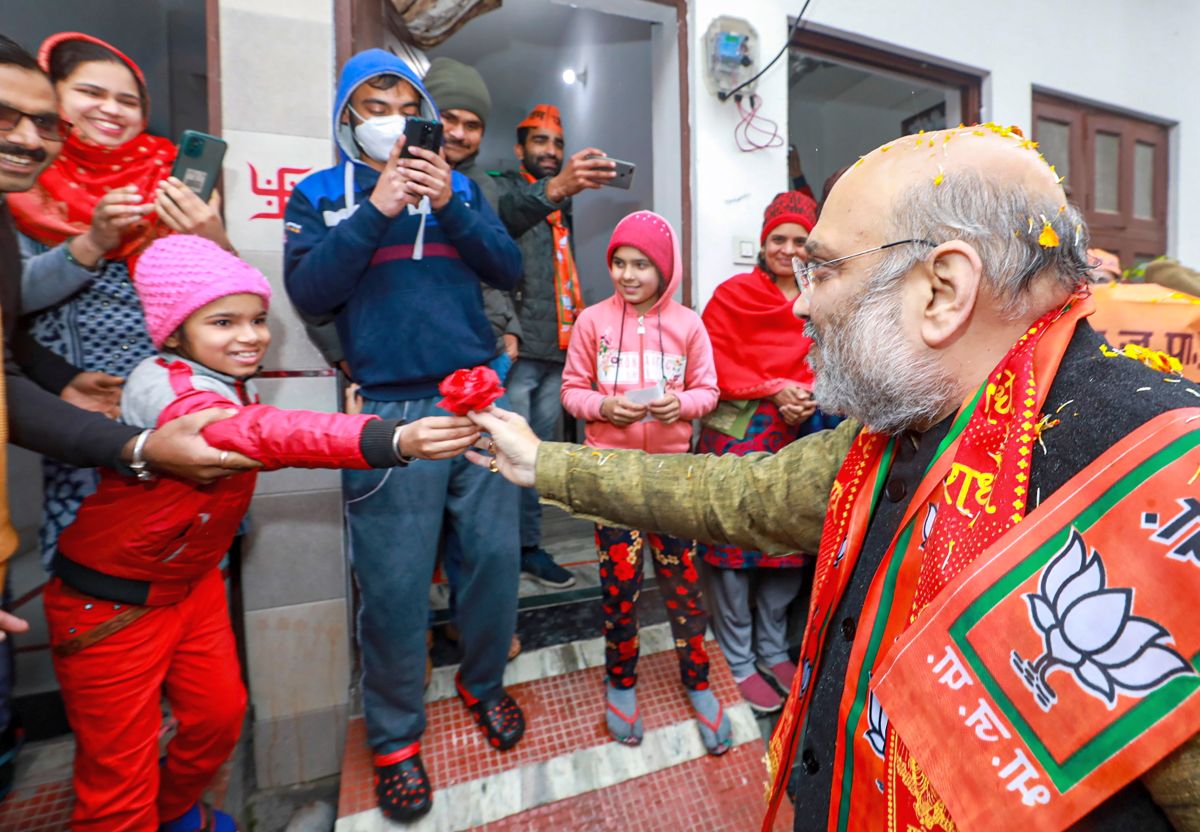 | « Back to article | Print this article |
Swami Prasad Maurya's resignation has forced the BJP to focus again on its outreach among OBCs.

A spate of resignations from the Yogi Adityanath government and the defection of lawmakers to the Samajwadi Party have given rise to speculation that the Bharatiya Janata Party might now have to rejig its plans of replacing unpopular MLAs, especially those from the Other Backward Classes.
Enquiries with top BJP leaders suggest the party will likely stick to its earlier plan of dropping around 20 per cent of the sitting MLAs, but this might no longer apply to the OBC MLAs.
A top party functionary said: "The party replaces such sitting candidates who don't fit into their constituencies's caste composition on parameters of popularity, the public image in recent years, etc. At the same time, the organisation also assesses how much damage a rebel candidate can cause."
"So, this time we thought that 60-65 sitting MLAs should be dropped or their seats should be changed. Those who fit the caste equation and are well-known in their areas will continue," he added.
"In other parties," he said, "candidates may get the ticket merely by pleasing the state president. That is not the case in the BJP. Here, it is the organisation that contests election symbolically. In other parties, candidates contest, with all the means available to them."
BJP state Vice-President Daya Shankar Singh said if a candidate was not in a position to win, replacement was necessary.
But according to him, there are other considerations too.
"Given the social-engineering factors, when the equations change, one's seat can be changed. Before taking a decision, we analyse not only the candidate but also his rival," he said.
In the first phase of the election, he said, "there will be change, but not in every district."
To assess the winnability of the candidate, the party at national level and in the state conduct their own survey processes.
In parallel, the Rashtriya Swyamsevak Sangh does its own assessment.
Sanjay Kumar of the Centre of Developing Societies agrees this is the working style of the BJP.
"This formula has been used in past elections to replace candidates whose prospects of winning are low. That's why the party may give it a try again this time. But recent defections may put pressure on such strategies."
Sources in the BJP say they were aware that there was resentment against the chief minister and political realignments are a fact of life before any election.
But Swami Prasad Maurya's resignation as minister accelerated the process and festering anger spilled out into the open.
This has forced the party to focus again on its outreach among the OBCs.
This consideration will inform the party's strategy of giving tickets and denying sitting candidates another chance.
This is especially worrying in the first phase of the election, when the party faces the maximum challenge.
"The BJP may lose a significant number of the seats this time as compared to the 2017 assembly and 2019 Lok Sabha elections. It is largely due to the resentment of farmers and Jats in western Uttar Pradesh," Sanjay Kumar said.
"Moreover, the SP-Rashtriya Lok Dal alliance in Western Uttar Pradesh is stronger with the support of the minority. If the state government had not announced slashing electricity tariffs for agriculture and a decision to clear sugarcane dues, the dent might have been bigger than what the BJP will be forced to face now," he added.
According to a political commentator who is an expert on Western UP, non-Yadav backward castes (Koiri, Kanchi, Tamoli, Teli, Lodh, Saini, etc) are present in large numbers in the area and their coalition with the BJP was forged by then UP chief minister Kalyan Singh. These communities usually support the BJP.
However, the Jat community continues to be cause for worry. There are at least 16 assembly seats in Western UP where the Jats account for 30-35 per cent of the vote. In the last assembly and Lok Sabha elections, they voted solidly for the BJP. This time, the situation might change.
Sensing this, the SP is readying for an aggressive fight against the ruling party, saying that the BJP has failed on every governance front and the farmers, the backwards, and the Dalits are unhappy with the performance of the government.
"Our position in Western UP is strong because there is anger among the farmers and Dalits at the ruling party's arrogance. People in Western UP are saying the BJP may bring back the farm laws (now rescinded) after the elections," former state minister and SP spokesperson Abhishek Mishra said.
Mishra is of the view that an anti-government sentiment is sweeping the whole state, but is especially strong in western UP.
"Our party welcomes all and it will give respect and power to everyone. There will be no ego clash."
Sanjay Kumar said the BJP's OBC vote base was likely to see some cracks due to recent developments and to compensate for it, there was a need to propose a larger narrative.
There is only one option: Primacy of religion over caste.
Daya Shankar Singh said the BJP was committed to the OBCs. "Which community do the prime minister, the state party president, and the deputy chief minister belong to? The OBCs are the most represented community in our party organisation and government. Their representation is more than their share in the population. The defections are more related to personal ambition."
The BJP has listed candidates for 57 out of 58 seats for the first phase and 48 out of 55 seats for the second phase.
Around 44 seats have been given to OBC candidates.
In this list, 62 MLAs and 12 ministers have retained their seats although 21 new faces have made their entry into the first list.